Your login information returned multiple users. Please select the user you would like to log in as and re-type in your password.

Warning: This article contains spoilers for BioShock: Infinite.
I recall the experience of finishing BioShock Infinite perfectly. Goosebumps covered my arm as endless lighthouses filled the screen and the concept of time and space narratively shattered before me. After three years of waiting for this installment, the anticipation was over and I was left with a dozen plot-related questions. For hours I sat silent and for days I obsessed over what it all meant and how I had felt about what it all meant. Then, the novelty of tears and quantum physics wore off and a question interrupted my daydrooling over what I had thought was the one of the most brilliant of stories written between the most genuine of characters.
The question I asked was, “What about oppression?”

As Booker and Elizabeth’s stories of redemption and freedom intertwined and concluded, I felt uneasy about my afterthoughts on the race narrative set up in the first two parts of the game, and swept under the rug in the final act. What about Daisy Fitzroy and the Vox Populi? Had I been so enthralled by the idea of quantum physics entering a game narrative that I had completely forgotten about race, oppression and the Vox Populi's revolution? Had I been blind and deaf to issues that were not only real in 1900s America, but still very real today? Had the game simply utilized race as a convenient backdrop just to benefit a story about a protagonist absolving sins from his past?
The Vox Populi, led by Daisy, had a cause to which I was committed – fight the oppressors. While many writings on Infinite praise Columbia and argued that the contrasting graphic violence is unsettling in the gameplay, I cherished it. I found Columbia to be a symbol of white privilege with its idyllic carnivals and I could almost smell the rich benefitting from oppression. Black people were forced to become passive, slaved bodies in this fantasy world and I wanted to burn the whole thing down. When I met Daisy, I knew I had to activate a revolution and turn Columbia into Rapture and I couldn’t have been happier. It became my duty destroy an ideology that is real. Oppression is everywhere and not limited to a historical narrative, and if I’m allowed to eradicate that in a video game then I will take what I can get.
That's not what happened, though.

The already cringe-inducing idea of Booker saving the day turned into a cringe-inducing reversal of power roles where the oppressors became the oppressed. Suddenly the Vox Populi became deranged with power, calling back (or forward in time) to the dick-measuring contest between Frank Fontaine and Andrew Ryan in Rapture. This is where I call bullshit. The Vox weren’t trying to just gain power, they were trying to raise their voice and eliminate a xenophobic social power that had been oppressing them. After all, Vox Populi is Latin for “Voice of the People,” and these are an enslaved people who deserve their voice. To abruptly turn them into exaggerated psychopaths and transform Daisy into a megalomaniac is irresponsible and awfully inaccurate for a narrative that utilizes racism for the sake of historical accuracy. There was an opportunity missed when a tear had to be opened to introduce Booker and Elizabeth to a fanatical Daisy instead of continuing on the narrative of Daisy trying to free slaves. Fighting the xenophobes was thrown out the window for the sake of introducing a different dimension of time.
My main problem is that it all gets discarded to make way for quantum daddy issues. No one speaks of race or revolution in the final baptism and we completely forget the point of the Vox Populi because this is about White Man Saviour Booker getting his redemption because of all of his White Man Guilt over his participation in The Wounded Knee Massacre. Of course, Daisy and the Vox aren’t able to justify their actions and tactics in Infinite because they have been turned into antagonists even though their revolution is something I would support a hundred times over forgiving Booker for killing Natives. Yes, Booker is half-Native and this complicates the “white” guilt, but keep in mind that we are learning through voxophones how he is trying to erase his ethnicity and that just because he is Native doesn’t lessen problems of race in this game. If anything, that implies the whole purpose of racism in this game is just to set up a story about a half-white half-Native man wanting to suppress his Native-self by murdering a lot of Natives and taking their scalps as trophies, and now he feels super bad about it. Even that we can’t explore because then it turns into a father/daughter relationship destroyed by – yet again – quantum physics.

While retracing steps into the racial narrative of Infinite, I had tweeted the following thought:
Intersectional feminism is needed in games when the white women are heroes (Elizabeth/Lara) and black women are THEIR enemies (Daisy/Joslin)
Even seemingly strong female protagonists are racialized because hopefully we can put aside race since hey, at least the writers are giving women a role. Intersectionality conceptualizes oppression as made up of various power structures which intersect to disenfranchise minority groups.This is the second time I have noticed in a AAA game this year that there is a presence of the independent white female protagonists (first being Lara Croft in Tomb Raider, second being Elizabeth in Infinite) who are destined to have a power-struggle with their black antagonists (Joslin Reyes and Daisy Fitzroy respectively). The intersection of oppression is not only being a woman, but also being a woman of colour who is only designed to be disliked by the white protagonists. Both games mirror Lara/Elizabeth as women trying to gain strength and indepdence, and Joslin/Daisy as women who have the potential to be good characters but then just lose that potential for some reason or another to become irrational and antagonistic.
We continuously fumble with ideas of games as art and games as forms of representation, but are we even capable of crossing that bridge if we continue to idolize narratives that can barely grasp oppression? I’ll repeat that there was an opportunity missed with Infinite that could have been a critique on oppression but what we are left with is another example to add to the long list of racist misrepresentations in the medium. The use of black oppression does nothing for this video game and is only utilized when the concept of traveling through time and space is convenient. It's unnerving, but mostly disappointing to see especially when the team creating this narrative is comprised of truly talented writers.
Disclaimer: Yes, I enjoyed playing BioShock Infinite. No, I am not hating on it. No, I am not calling out specific writers as being racist, but I am citing irresponsible ignorance on the race narrative. This is a critique meant to open up dialogues on race and oppression, not to spread hate or be inflammatory.




Comments
12 years, 7 months ago
It bothered me too that Fitzroy ended up a crazed villain as well like so many characters in the bioshock games and the only explaination that was given was booker being alive that he "complicated the narrative"
12 years, 7 months ago
I can't agree more. This is something I thought of when I was writing my piece about racism, and while I did (and still do) give props to Bioshock Infinite for being direct and actually showing real-life racism as opposed to symbolically attaching racist themes to a fantasy species, that boldness really goes away after a certain point in the game, right about at the time you meet Daisy, if not earlier. Sucks, because she's probably my favorite character and I wouldn't mind playing an entire game as her on a quest to knock Columbia out of the air.
The saddest part is, while I was reflecting on this, I remembered that Bioshock is not at all the first game to pull this crap. I can think of at least two other games in this generation alone with very similar problems.
12 years, 7 months ago
I dont think they are ignorant or irresponsible at all for telling the story they wanted to tell. I actually liked the complete trade of roles between Comstock/Voxpopuli. The fact that you want to give these people power and help them get that power only to see them use it in the worst way and become no better then Comstock was interesting to me.
I felt the game was more about violence and how bad people can be more so then oppression anyway.
12 years, 7 months ago
I'd like to agree with others on saying I was a bit disappointing Daisy was forced into the "evil villain" role. I was kind of excited to be helping this person and was hoping to do more with her later. Guess not.
12 years, 7 months ago
I have to disagree. I feel like it is pretty obvious as to the influences the game drew from the French Revolution in building the idea of the Vox Populi, kind of drawing historical parallels to violence created for a seemingly good cause. I don't think it is unheard of for a movement created on a basis of hatred for the white ruling class to enter the realm of slaughtering the citizens who supported the oppressor regime. Actually I don't really agree with your point that the game turned Daisy into a villain either, so much as the game portrayed Daisy as the reasonable product of the situation she was chained to. I think it is much more powerful to speak of the dangers of hating something everyone knows is wrong (racism in this case), rather than just delivering due justice. While the whole idea of racism and oppression was thrown on the back-burner towards the end (a point I do agree with), I do not see how the scifi/multiple universe aspect of the game could have been explained as well as it was without sacrificing some of the social commentary. Sooo I just choose to view it as a necessary tradeoff where the whole race issue may not have been explained as well as it could have been in favor of the ending we did get.
12 years, 7 months ago
You are really short changing the character of Dewitt. This isn't a man who is haunted by the prejiduces he had during Wounded Knee but a man looking back at every decision he has ever made and realizing that he has made nothing but poor choices. As well as being a soldier at wounded knee, he was a Pinkerton, the detective agency brought in by Southern coal barons to ensure that the miners wouldn't be able to unionize. The history of the Pinkertons runs with blood and deceit, their infiltration of the unions led to revolts that rival that of the Civil War in loss of life as well as the implications of murder of their share of union leaders. Prior to the course of the game, Dewitt has made nothing but bad decisions one after another until he is left a broken man in a run down two room apartment with no recollection of events from a short time ago.
The game doesn't focus on race alone either, we also see the poverty brought forth by company towns on par with that of the aforementioned coal mines. As well as black, Chinese, and Native American workers, Fink, who has a monopoly on voxophones, vigors, pretty much all of the science fictiony products in the game, hires poverty stricken white workers as well. Prior to entering Finkton, there are a number of desperate, poor white workers lining up along side the black workers. The shantytown is filled with poor peoples from all walks of life scrounging for money and food. Fink's private security is ruthless in maintaining the work force as you will often find workers in the stockade as agitants. The character of Dewitt was partially responsible as a soldier and Pinkerton for all of the themes that were prevalent in Columbia. Hell, Columbia is the reflection of all of his sins.
The change in the vox populi isn't all that of a stretch, the sudden change in the status quo has drastic repercussions. Revolution rarely fared well for the losers, the the former slaves of the Haitian Revolution repayed their former masters' cruelties with "pillage, rape, torture, mutilation, and death." The stories many English refugees brought with them terrified US slave holders and led them to crack down on possible slave revolts. In China especially, the change in the status quo was detrimental to any well off land owner or town leader as accusations of oppression quickly escalated to arrest and forced labor.
12 years, 7 months ago
Your tweet: Fuck, fuck fuck shit. I'm so pleased to see leads like Elizabeth and Lara, but you're on the money with them having to square off against POC. Thanks, women are under-represented and now we get to fight among ourselves? Fuck.
12 years, 7 months ago
While I will admit that i have never played any of Ken Levine's games I feel that all of them have similar themes. Namely the theme of power and its corrupting abilities. I feel that in almost all his games, Bioshock (Infinite) and System Shock 2 they are trying to say that once someone has power they will always be corrupted. I think that is the main point that they were trying to make with that switch in character with Daisy. That does not change the fact that they totally dropped the issue of race at the end to make room for silly scifi elements. Could you maybe explain "games as forms of representation" I have never heard of that used for games before.
12 years, 7 months ago
I'm hoping that the Vox will be covered more with the dlc. I was very interested in the Vox's story after the first time you encounter Daisy in the game and was excited to see how that played out but it did seem as though the writers pushed that whole section of the plot aside to make room Booker and his story progression. I was hoping the experience with Daisy would sort of turn out something like Sander Cohen's in the original. Not the whole 'take pictures of dead guys and put them in an art show' kind of thing but just the whole experience of meeting Cohen and spending actual time completing tasks for him, exploring 'His' side of Rapture and coming to a satisfying ending or epilogue.
On the topic of racism, I was a little bit surprised at how upfront it was about the topic for a modern video game and one that actually takes place on earth with a semi-realistic tone for the setting. It seemed to start strong with a powerful setup at the beginning sequence but then it just sort of left it there and put a little extra in voxophones or in a few rooms with a couple sentences of dialogue concerning the subject. While the attention on it fizzled out, I figured it was some sort of zeitgeist type of deal but then it wasn't really brought up at all. It seemed to have the potential to be its own narrative, with the Vox and Daisy being woven into it. The revolt of the Vox and the poverty-stricken workers against Comstock was a pretty big deal that didn't last very long in the story. Maybe the writers felt that Booker, Elizabeth and Parallel Universes were more important than all of that, even at the cost of abandoning potential story arcs. As I stated above, my only hope now is that the dlc will actually cover these topics and not just spew out Vigor packs and alternate gun decorations.
I didn't really think too much on these points myself until I read this article. I'm glad I read it, thank you.
12 years, 7 months ago
I'll hold myself back to answering here. I'm writing a blog post in response to responses to the game similar to your article, but my mood will kinda dictate if I'll actually put it up (and if I have actual time to do finish it). Nonetheless, I will say this for now: fantastic read, though I don't agree with any your points.
That said, I hope to see more articles like this on the site. Keep up the good work!